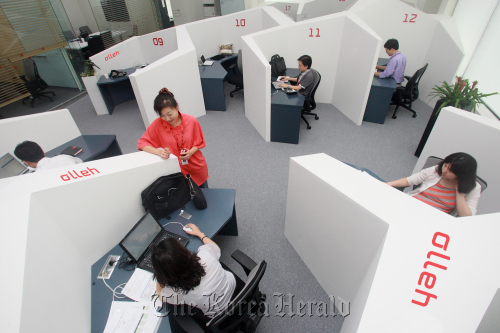Recent survey shows eight out of every 10 are smart workers
The mass introduction of smart gadgets in the country has not only changed the lifestyles of many Koreans, but also impacted the way people do their jobs here.
A recent consumer study conducted by U.S.-based firm VMware found that at least eight out of every 10 employed Koreans could be dubbed “smart workers,” indicating that they have somehow adopted a flexible working style ― mobile offices, virtual meetings and working in remote areas ― into their workplaces.
According to the report unveiled at a press conference in Seoul on Wednesday, about 82 percent of “smart workers” said they worked outside of the office at least some of the time, with 76 percent working at home and 64 percent working on the road.
The mass introduction of smart gadgets in the country has not only changed the lifestyles of many Koreans, but also impacted the way people do their jobs here.
A recent consumer study conducted by U.S.-based firm VMware found that at least eight out of every 10 employed Koreans could be dubbed “smart workers,” indicating that they have somehow adopted a flexible working style ― mobile offices, virtual meetings and working in remote areas ― into their workplaces.
According to the report unveiled at a press conference in Seoul on Wednesday, about 82 percent of “smart workers” said they worked outside of the office at least some of the time, with 76 percent working at home and 64 percent working on the road.

The survey was answered by at least 1,000 employees of multinational corporations between the ages of 18-64.
VMware, headquartered in California, is a firm specializing in virtualization software and cloud infrastructure that also provides the ground work for the establishment of smart work systems.
The survey also found that nine out of every 10 respondents voluntarily take part in smart working by bringing their personal portable devices, such as smartphones and tablet PCs, to work, said the survey.
“Fifty-nine percent of the surveyed said they are happier using their own devices. They say it’s more productive, more efficient and they felt less stressed,” said Andrew Dutton, senior vice president and general manager of Asia Pacific at VMware.
Yoon Moon-seok, country manager for Korea at VMware Global also said, 52 percent feel less stressed and more comfortable with work after the introduction of the smart work system, while 68 percent say it’s more efficient and effective.
As exemplary cases, employees at Hyundai Heavy Industries, which is among the organizations using cloud infrastructure for its smart work system, do not need to bring their laptops wherever they go since the program and data has already been centralized through the data virtualization, according to Yoon.
“They have already set their targets to go mobile,” he said.
Another example, doctors at Gangnam Severance Hospital do not need patients to come to their offices for consultations, but bring the charts and X-rays on tablet PCs to the patients’ beds, Yoon added.
However, the smart work system should only be introduced with the protection of regulations, compliance and privacy, which is why its cloud infrastructure is gaining popularity in Korea, he said. A related tool called the horizon app manager is scheduled to be released later this year.
In a related effort, an increasing number of firms in the nation are in the process of embracing the smart work policy.
KT Corp., the country’s biggest fixed-line service operator, is one of the firms most actively making moves to introduce the smart working system among Korean companies.
Since opening a smart work center for the first time in the country in September 2010, it has about an average of 2,900 of its workforce taking part in the program that enables workers to cut out their long distance commutes and go to nearby smart work centers.
The new smart work centers are remote work spaces where users can bring their laptops to do company work. KT currently has a total of 16 of these flexible work centers, but plans to increase that figure to 30 by the end of this year, according to its officials.
It also distributes Apple’s iPad to all of its employees to promote the effort.
“The satisfaction level of the employees has gone up to a great extent with those visiting nearby work stations in case of emergencies and some others working at home when they are met with childcare problems. Some others that require a high level of concentration also make use of the nearby smart work centers,” said a KT official.
The move comes as the company found the new flexible working system brought positive outcomes such as an increase in productivity in a group that tested the system earlier.
Its officials also said the introduction of the new working system is expected to reduce commutes by 25,000 hours, cut carbon emissions by 550,000 tons and curb direct expenses by 330 billion won.
The move was also a match to the government’s plan to promote smart working environments, setting its goal of boosting the portion of “smart workers” to 30 percent of the employed population by 2015.
Samsung SDS, another local firm that adopted the smart working system at a relatively early stage, is a supporter of telecommuting, for it provides computers, printers, telephones and office automation products for those who wish to transform their homes into home offices.
The company also has turned parts of its offices in Seoul and the other metropolitan areas as sections that could be freely used by visiting employees.
The firm was also among the few to feature the “flextime program” last year, a program that allows its staff to select what time they can show up at the office from 6 a.m. to 1 p.m.
On top of those programs, it optimized its cloud computing technology to have employees access the integrated office server whenever they want and wherever they are located, its officials said.
By Cho Ji-hyun (sharon@heraldcorp.com)
-
Articles by Korea Herald



![[AtoZ into Korean mind] Humor in Korea: Navigating the line between what's funny and not](http://res.heraldm.com/phpwas/restmb_idxmake.php?idx=644&simg=/content/image/2024/04/22/20240422050642_0.jpg&u=)


![[Herald Interview] Why Toss invited hackers to penetrate its system](http://res.heraldm.com/phpwas/restmb_idxmake.php?idx=644&simg=/content/image/2024/04/22/20240422050569_0.jpg&u=20240422150649)
![[Graphic News] 77% of young Koreans still financially dependent](http://res.heraldm.com/phpwas/restmb_idxmake.php?idx=644&simg=/content/image/2024/04/22/20240422050762_0.gif&u=)








![[Exclusive] Korean military to ban iPhones over security issues](http://res.heraldm.com/phpwas/restmb_idxmake.php?idx=652&simg=/content/image/2024/04/23/20240423050599_0.jpg&u=20240423171347)



![[Today’s K-pop] Ateez confirms US tour details](http://res.heraldm.com/phpwas/restmb_idxmake.php?idx=642&simg=/content/image/2024/04/23/20240423050700_0.jpg&u=)